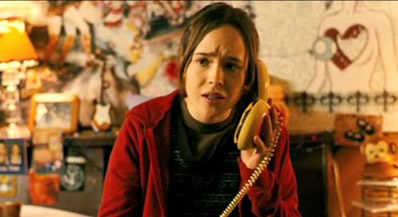|
|
Director's Spotlight: Jason ReitmanBy Joshua PaschSeptember 29, 2010
Juno Perhaps replacing Little Miss Sunshine as the ultimate of the quirky indie comedy Oscar hopefuls, Juno stormed onto the 2007 scene with its fast jiving pregnant teen with a name like the city in Alaska but don’t tell her that. It featured such quirky elements as a sister named Ladybug, Michael Cera, an animated sketch opening credit sequence, and parents that don’t yell when they discover their teenage daughter is pregnant. Would you expect anything less from a screenplay written by a woman named Diablo? Juno was a film that many people loved and a few people hated. Jokes about its preggers teenage lead immediately made pop culture waves. People dress like Michael Cera’s Paulie Bleeker for Halloween. Juno cemented Cera’s spot atop the sexy-nerd hierarchy. And it is hard to watch Ellen Page in Inception without picturing her with a baby bulge. The movie, to its supreme credit, manages to feel realistic and mature even with all of its eccentricity. Juno grapples with a visit to an abortion clinic. She befriends her child’s would-be adoptive parents, and learns that love and marriage and child rearing and everything in between is not nearly as scripted as it seems. And maybe that is Juno’s greatest strength – that she (and the movie) is open to taking us down a path that other teenagers (and movies) wouldn’t. Juno is lucky to have such a strong group of supporters to help her cope. Spider-Man scene-stealer and Jason Reitman regular JK Simmons plays her curmudgeonly but supporting father, Allison Janney is the surprisingly protective stepmother, and Olivia Thirlby (relegated to what I like to call the “Gretchen Weiner” role of best female friend) deserves roles as well written as this one. Juno was the dark horse of the awards season that year, eventually losing out in the Best Picture race to the far more grave No Country For Old Men. It did win for Best Original Screenplay, a category that seems to have been made for those films that are considered too “out there” to win best picture. Regardless, the film had plenty of awards season love and it parlayed those positive vibes into a blockbuster $143 million domestically – more than twice what the similarly toned Little Miss Sunshine managed a couple of years earlier.
|

|
|
|

|
Saturday, May 18, 2024
© 2024 Box Office Prophets, a division of One Of Us, Inc.


